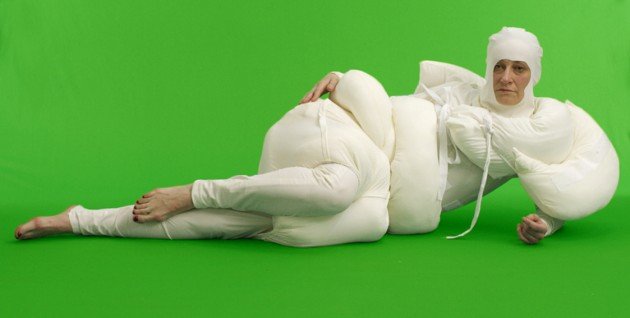The LCCA Summer School Error?!
Where: Ruckas Manor, Cēsis (Latvia)
When: 11 June until 15 June 2016
Curators: Zane Zajančkauska, Valts Miķelsons, Inga Lāce and Andra Silapētere.
The theme of the 2016 edition Error?! focuses on the role of erring in thinking and art. Among the subjects of discussion are slowness as a conscious strategy in cinema and contemporary art; absurd and nonsense in literature and visual art; buffoonery as a strategy – as resistance and critique; as release from learned forms of seeing and experiencing.
Taking into account that in many European languages the word "error" in the sense "to stray, err" (from Latin errorem) has a much longer history than the notion of "error" as "failure", the LCCA Summer School revisits the various meanings of erring in creative processes and hopes to contribute in restoring the good name of errors. It turns to such questions as: What is the role of errors and erring in acquiring new knowledge and experiences? In what ways can errors shed light on systems and structures upon which we rely? Which practices of art are located in the zone of systemic errors? Can erring and accidents become a conscious practice?
More about lecturers of the Summer School:
Michael Ramscar countsconcepts, metaphors, analogies, language learning and processing, and all manner of mental representations among his interests. He studies philosophy, computer science, and finished a PhD in Artificial Intelligence and Cognitive Science. We invited him to talk about the importance of being wrong.
We invited Rosa Bartosi and Elīna Reitere to collaborate ongivingus food for thought regarding slowness and film, and ways of watching. Rosa Barotsi is a film theoretician, her recent work looks at the notions of failure and misuse in contemporary art cinema both as tools for radical politics and as endemic characteristics of ‘debt capitalism’. Elīna Reitere is also a film theoretician, recently finished her PhD on narrative in Slow Cinema, has also worked as the director of the Riga Film Museum and writes about film.
Travis Jeppesen is an artist working in the medium of language. His books include novels such as Victims, Wolf at the Door and The Suiciders, poetry, amongst them Dicklung & Others, Poems I Wrote While Watching TV, and art criticism, such as Disorientations: Art on the Margins of the “Contemporary”. We invited him so that we could explore his method: an object-oriented writing – a metaphysical form of art writing that attempts to channel the inner lives of objects.
Kaspars Groševs is an artist and,as an artist, he works with sound, text, video, paint, other artists, he is co-founder and curator of gallery 427 in Riga.We invited him to share his ways of dealing with uncertainty.
Valentinas Klimašauskas is a curator and writer, interested in the robotics of belles-lettres. Among other things, he hosts collective reading performances and other performative acts that often deal with reading and texts. We invited him to get acquainted.
Paul Clinton is a writer and is assistant editor of Frieze. He has taught on art, stupidity and queer theory at Goldsmiths College and recently curated (together with Anna Gritz) exhibition 'duh? Art & Stupidity' at Focal Point Gallery (Southend-on-Sea, UK). We invited him to talk about unpacking the political and representational issues coming from artists and critics who work with stupidity.
Haralds Matulis has many faces – having studied philosophy and social anthropology he works as a publicist, critic, translator, and has been active in shaping cultural policies in Latvia. We invited him to talk about Daniil Kharms and his writings.
Laura Prikule is an arist interested in ideas, their formation or growth, as well as processes of interaction which link contrasting areas of culture. She works with plants, people, objects, colours, texts and sound. We invited her because she is interested in structures, and structures are full of errors.
Indrek Grigor is an art critic, curator and semiotician, he is an explosive device when it comes to art criticism. We invited him to hear more about the power of unwritten texts and his findings in typology of art criticism.
Edd Schouten is an artist and choreographer. His choreographies are often centred around structured scores with the intention of engaging both the performer and the viewer in a spatial engagement. We invited him because erring means moving.
Styrmir Örn Guðmundsson is an artist, storyteller, performer,maker of objects and illustrator who has a love for the absurd, by which he means less an obsessive passion for the ridiculous, nonsensical or the odd, than a tender and caring attitude: he looks after the absurd, he helps it develop, he gives it a place alongside everything else, where it can be your most disturbing neighbour and your best friend.
Summer School Error?! is organised within the LCCA education programme, which is based on the exploration of current contemporary art processes in the form of lectures, workshops and other discoursive events with the aim of strengthening the development of informal education, critical thinking and discussion in the Latvian art scene. One of the most visible activities of the programme is the series of reading workshops, LCCA Evening School, which turns to questions of contemporary art through the experience of reading texts by important theoreticians.
This event a part of a collaborative project "This is Tomorrow. Back to Basics: Forms and Actions in the Future" co-funded by the Creative Europe programme of the European Union, Ministry of Culture of the Republic of Latvia, State Culture Capital Foundation, Cēsis Regional Council.
Programme of the LCCA Summer School 2016__ENG.docx Read more
